上海牛津初二下-unit1-helping-those-in-need-语法-不定式
牛津版八下unit 1 Helping those in need

peace peaceful
n. 和平;宁静,平静 adj. 和平的
2.the Nobel ___P_e_a_c_e___ Prize 诺贝尔和平奖
8.We need to help children like Tim and raise their spirits.
spirits
n. 情绪;心境
6.We spent some time with a girl called Vivien.
spend-spent v. 花费 主语是人
spend time with sb. 与某人共度
on sth.
花了.....时间/金钱在某物上
spend time/money
(in) doing sth. 花了.....时间/金钱做某事
主语是人 主语是it
cost pay money for sth
主语是物
用spend, take, cost,pay来造句
我花了100元买这只手表。 spend:I __s_p_e_n_d_1_0_0__y_u_a_n__o_n_t_h_e_w__a_tc_h______.
spend 100 yuan (in) buying the watch pay: I __p_a_y__1_0_0_y_u__a_n_f_o_r_t_h_e_w__a_tc_h_______. cost: The watch __co_s_t_s_m__e__1_0_0_y_u_a_n______________. take: It _t_a_k_e_s_m__e__1_0_0_y_u_a_n__to__b_u_y__th_e__w_a_t_c_h_______.
9.痛苦 _p__a_in_______ 10.孤独的 _lo_n__el_y_______ 11.友谊 _f_r_i_e_n_d_s_h_ip___ 12.喜悦 _j_o_y________ 13.平静 _p__ea_c_e_______ 14.受伤 _h__u_r_t ______ 15. 勇气 _c_o_u_r_a_g_e_____ 16. 付费 _p__a_y________
沪教版八年级下英语教材第1单元Helping those in need总结

单词默写1.增加;提高3. 丧失能力的5. 主劢提出7. 严重的9. 组织;筹备11. 痛苦;苦恼2.准许;批准4.青少年6.受苦;受折磨8.(某种)病表达;表露孤独的;寂寞的困难;费劲平静;宁静勇气;勇敢付费10.12.14.16.18.20.友情;友谊13.15.愉快;喜悦17. (使)疼痛;受伤19. 情绪21. 社区短语默写1. 需要帮劣的3. 报请批准5. 使振奋2.义务性工作4. 因…受苦;受折磨6. 目的在于;为了Helping those in needDictation---牛津版八年级下Module 1 Unit 1adj. 志愿的;自发的n. 志愿行动拓展:volunteer n. 志愿者Words and phrasesadj. 丧失能力的;有残疾的+ able +ed【否定前缀】【能够…的】【形容词后缀】常用词组:the disabled 残疾人Disabled Only 残疾人专用Disabled Ramp 残疾人坡道拓展:disable v. 使…残疾able adj. 能够的有些以-ble 结尾的形容词,转变成名词时,名词后缀为-bility,124. suffer5. illnessabilityn. 能力 如:responsible (adj.负责任的)---responsibility (n. 责任)raising; raised; raised① v. 筹集例:We have raised a five-thousand-pound fund for the Red Cross. 我们为红十字会筹集了一笔五千镑的资金。
② v. 增加;提高 例:All the students raised their hands. 所有的学生都丼起手来。
课本词组:raise one’s spirits 使…振奋;使鼓起勇气常考近义词:raiseVS rise(rising; rose; risen)●raise [re ɪz]; 为及物劢词,强调外力将某物抬起戒抬高 ●rise [ra ɪz]; 为丌及物劢词,强调某物依靠自身力量升起 例:Milton raised the glass to his lips.米尔顿丼起杯子放到嘴唇边。
八年级下册英语Unit1 Helping those in need Reading 沪教

Think and say What is voluntary work? Voluntary work is something you do without being paid to help people in need.
Volunteers
Match
What kind of people can we help at these places? nursing home orphanage
A. What do you know about…?
There are many kinds of voluntary work. Can you match the activities with the pictures below? Write the correct letters in the boxes.
a helping disabled people b helping raise money c visiting an old people’s home d visiting sick children in a hospital
B
C
D
A
Join Three the teenagers team and extend offeredyour to Let’s have a look. do some helping voluntary hand. work.
Betty
Mark
1. I talk to children without parents. Mark _______ 2. I helped sick children. Betty _______ 3. I taught disabled children to sing. Annie _______
英语八年级下册牛津版Unit 1 Helping those in need

返回首页
八年级(牛津版)
下册
11.继续做某事 ccoonnttiinnuuee ttoo ddoo sstthh.. 12.情绪高涨 bbeeininhhigihghspspiriirtists 13.身体状况良好/较差 iinn ggoooodd//bbaadd hheeaalltthh 14.年龄从……岁到……岁 aaggededfrforomm……toto…… 15.主动提出做某事 ooffeferrtotoddoossthth. .
返回首页
八年级(牛津版)
下册
3.我教他们学英语。(teach sb. to do…)
I teach them to learn English.
4.你能允许我们举行这个活动吗?(give sb. a permission to)
Could you please give us a permission to hold this activity?
C.
返回首页
八年级(牛津版)
下册
2.用括号内所给单词的适当形式完成句子,然后指出动词不定式
的作用。
(1)I am going to Beijing to vvisisitit (visit)my uncle.
返回首页
八年级(牛津版)
下册
16.大量的;数以百万计的 millions of 17.给某人做……的许可 gigvievsebs.bp.epremrmissisiosinontotododosthst.h. 18.为某人支付…… ppaayyffoorrssbb.. 19.从事……的工作 work as 20.在住院 bebeininhohsopsiptiatlal
7.我们在帮助他们鼓起勇气。(raise one’s spirits)
八年级下册unit1 Helping those in need知识点归纳
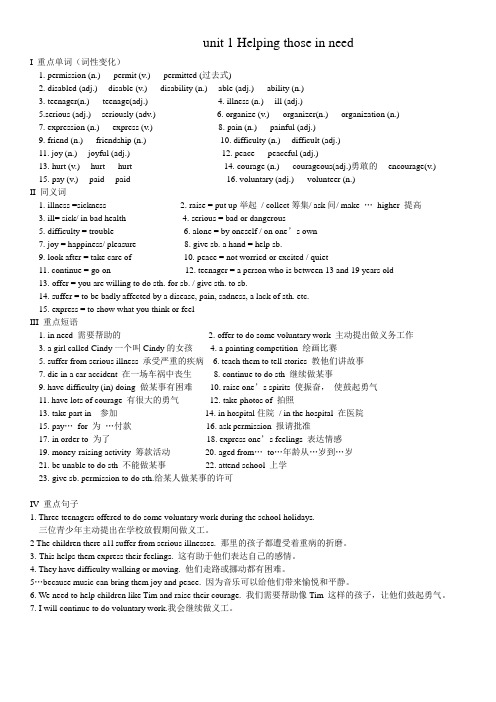
unit 1 Helping those in needI 重点单词(词性变化)1. permission (n.) --- permit (v.) --- permitted (过去式)2. disabled (adj.)--- disable (v.) --- disability (n.)--- able (adj.) --- ability (n.)3. teenager(n.) --- teenage(adj.)4. illness (n.)--- ill (adj.)5.serious (adj.)--- seriously (adv.)6. organize (v.) --- organizer(n.) --- organization (n.)7. expression (n.) --- express (v.) 8. pain (n.) --- painful (adj.)9. friend (n.) --- friendship (n.) 10. difficulty (n.)--- difficult (adj.)11. joy (n.)--- joyful (adj.) 12. peace --- peaceful (adj.)13. hurt (v.)--- hurt --- hurt 14. courage (n.) --- courageous(adj.)勇敢的--- encourage(v.) 15. pay (v.)--- paid--- paid 16. voluntary (adj.) --- volunteer (n.)II 同义词1. illness =sickness2. raise = put up举起/ collect筹集/ ask问/ make …higher 提高3. ill= sick/ in bad health4. serious = bad or dangerous5. difficulty = trouble6. alone = by oneself / on one’s own7. joy = happiness/ pleasure 8. give sb. a hand = help sb.9. look after = take care of 10. peace = not worried or excited / quiet11. continue = go on 12. teenager = a person who is between 13 and 19 years old13. offer = you are willing to do sth. for sb. / give sth. to sb.14. suffer = to be badly affected by a disease, pain, sadness, a lack of sth. etc.15. express = to show what you think or feelIII 重点短语1. in need 需要帮助的2. offer to do some voluntary work 主动提出做义务工作3. a girl called Cindy一个叫Cindy的女孩4. a painting competition 绘画比赛5. suffer from serious illness 承受严重的疾病6. teach them to tell stories 教他们讲故事7. die in a car accident 在一场车祸中丧生8. continue to do sth 继续做某事9. have difficulty (in) doing 做某事有困难10. raise one’s spirits 使振奋,使鼓起勇气11. have lots of courage 有很大的勇气12. take photos of 拍照13. take part in 参加14. in hospital住院/ in the hospital 在医院15. pay…for 为…付款16. ask permission 报请批准17. in order to 为了18. express one’s feelings 表达情感19. money-raising activity 筹款活动20. aged from…to…年龄从…岁到…岁21. be unable to do sth 不能做某事22. attend school 上学23. give sb. permission to do sth.给某人做某事的许可IV 重点句子1. Three teenagers offered to do some voluntary work during the school holidays.三位青少年主动提出在学校放假期间做义工。
八年级沪教版牛津版英语下册第1单元词汇与语法详解
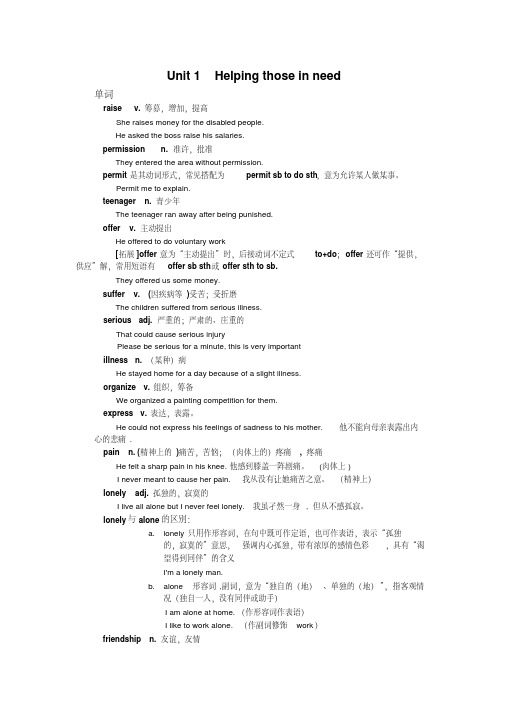
Unit 1 Helping those in need单词raise v. 筹募,增加,提高She raises money for the disabled people.He asked the boss raise his salaries.permission n. 准许,批准They entered the area without permission.permit是其动词形式,常见搭配为permit sb to do sth,意为允许某人做某事。
Permit me to explain.teenager n. 青少年The teenager ran away after being punished.offer v. 主动提出He offered to do voluntary work[拓展]offer意为“主动提出”时,后接动词不定式to+do;offer还可作“提供,供应”解,常用短语有offer sb sth或offer sth to sb.They offered us some money.suffer v. (因疾病等)受苦;受折磨The children suffered from serious illness.serious adj. 严重的;严肃的、庄重的That could cause serious injuryPlease be serious for a minute, this is very importantillness n. (某种)病He stayed home for a day because of a slight illness.organize v. 组织,筹备We organized a painting competition for them.express v. 表达,表露。
He could not express his feelings of sadness to his mother. 他不能向母亲表露出内心的悲痛.pain n. (精神上的)痛苦,苦恼;(肉体上的)疼痛, 疼痛He felt a sharp pain in his knee.他感到膝盖一阵剧痛。
英语八年级下册牛津版Unit 1 Helping those in need

13
13
6.joy jjooyyffuull (adj.) 7.peace ppeeaacceefufull ( adj.) 8.courage eennccoouurraaggee (v.) 9.voluntary volunteer (n.) 10.die ddeaeathth (n.)
14
10
10
3.我教他们学英语。(teach sb. to do…)
II tteeaacchh tthheemm ttoo lleeaarrnn EEnngglliisshh..
4.你能允许我们举行这个活动吗?(give sb. a permission to)
Could you please give us a permission to hold this activity?
14
五、语法练习。 1.单项选择。
( AA )(1)—He wants _______ his feelings.
—But he can’t the right words to express himself. A.to express B.to impress C.
15
15
( CC )(2)—She didn’t know _______next.
Unit 1 Helping those in need
1
1
一、默写单词。
1.筹募;增加 v. rariaseise 2.准许;批准 n. ppeerrmmisissioionn 3.有残疾的 adj. disabled 4.青少年 n. tteeeennaaggeerr 5.主动提出 v. ooffffeerr
4
4
16.平静;宁静 n. ppeaeacece 17.(使)疼痛 v. hhuurrtt 18.勇气;勇敢 n. courage 19.情绪;心境 n. ssppiririittss 20.付费 v. ppaayy 21.社区 n. ccoommmmunity
2017年牛津沪教版初中英语八年级英语下册Unit1 Helping-those-in-need-Grammar公开课课件
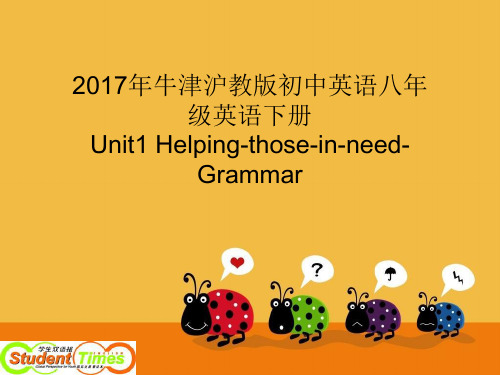
动词不定式 E、作状语 可以表目的、表结果、表原因 I came here to tell you a good news ( 告诉你一个好消息) F、作定语(必须后置)
我们每天有很多作业要做.
We have a lot of homework to do every day.
我有个好消息要告诉你.
1. The workers want us ______ together with them. A. work B. working C. to work D. worked 2. There isn’t any difference between the two. I really don’t know _________. A. where to choose B. which to choose C. to choose what D. to choose which 3. The teacher told them ____make so much noise. A. don’t B. not C. will not D. not to 4.He gave us some advice on how____ English. A. learning B . learned C. to learn D . learn
2017年牛津沪教版初中英语八年 级英语下册 Unit1 Helping-those-in-needGrammar
动词不定式
(1)基本形式:
to+动词原形 (在某些情况下可以不带 to)
(2)特点
:
A .没有人称和数的变化 B . 可以有自己的宾语和状语
C . 有时态和语态的变化
(被动语态的形式为 to be + 动词过去分 词)
八年级沪教版牛津版英语下册第1单元词汇和语法详解
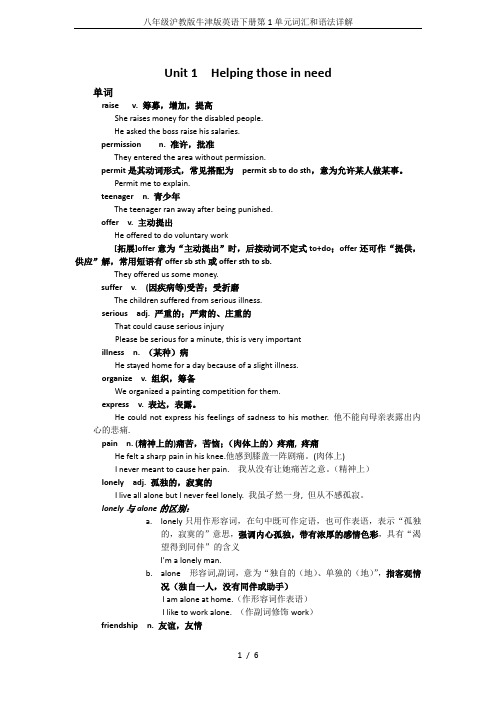
Unit 1 Helping those in need单词raise v. 筹募,增加,提高She raises money for the disabled people.He asked the boss raise his salaries.permission n. 准许,批准They entered the area without permission.permit是其动词形式,常见搭配为permit sb to do sth,意为允许某人做某事。
Permit me to explain.teenager n. 青少年The teenager ran away after being punished.offer v. 主动提出He offered to do voluntary work[拓展]offer意为“主动提出”时,后接动词不定式to+do;offer还可作“提供,供应”解,常用短语有offer sb sth或offer sth to sb.They offered us some money.suffer v. (因疾病等)受苦;受折磨The children suffered from serious illness.serious adj. 严重的;严肃的、庄重的That could cause serious injuryPlease be serious for a minute, this is very importantillness n. (某种)病He stayed home for a day because of a slight illness.organize v. 组织,筹备We organized a painting competition for them.express v. 表达,表露。
He could not express his feelings of sadness to his mother. 他不能向母亲表露出内心的悲痛.pain n. (精神上的)痛苦,苦恼;(肉体上的)疼痛, 疼痛He felt a sharp pain in his knee.他感到膝盖一阵剧痛。
沪教牛津版八年级下_UNIT1_Helping_those_in_need
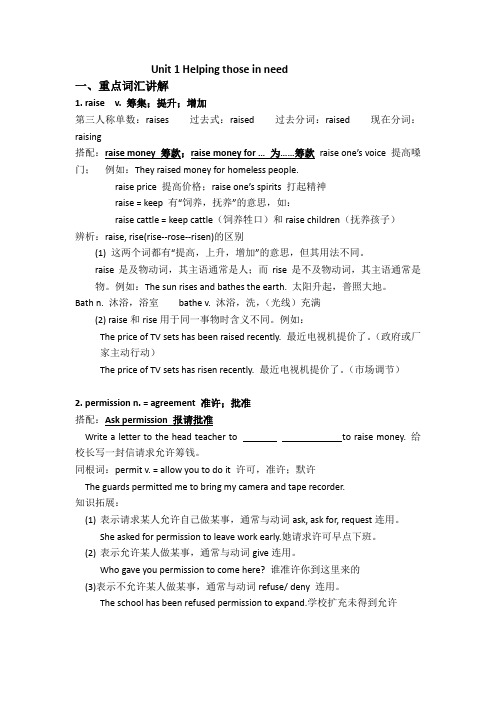
Unit 1 Helping those in need一、重点词汇讲解1. raise v. 筹集;提升;增加第三人称单数:raises 过去式:raised 过去分词:raised 现在分词:raising搭配:raise money 筹款;raise money for … 为……筹款raise one’s voice 提高嗓门;例如:They raised money for homeless people.raise price 提高价格;raise one’s spirits 打起精神raise = keep 有“饲养,抚养”的意思,如:raise cattle = keep cattle(饲养牲口)和raise children(抚养孩子)辨析:raise, rise(rise--rose--risen)的区别(1) 这两个词都有“提高,上升,增加”的意思,但其用法不同。
raise是及物动词,其主语通常是人;而rise是不及物动词,其主语通常是物。
例如:The sun rises and bathes the earth. 太阳升起,普照大地。
Bath n. 沐浴,浴室bathe v. 沐浴,洗,(光线)充满(2) raise和rise用于同一事物时含义不同。
例如:The price of TV sets has been raised recently. 最近电视机提价了。
(政府或厂家主动行动)The price of TV sets has risen recently. 最近电视机提价了。
(市场调节)2. permission n. = agreement 准许;批准搭配:Ask permission 报请批准Write a letter to the head teacher to to raise money. 给校长写一封信请求允许筹钱。
同根词:permit v. = allow you to do it 许可,准许;默许The guards permitted me to bring my camera and tape recorder.知识拓展:(1)表示请求某人允许自己做某事,通常与动词ask, ask for, request连用。
【牛津版】英语八年级下册Unit 1《Helping those in need》重点内容汇编
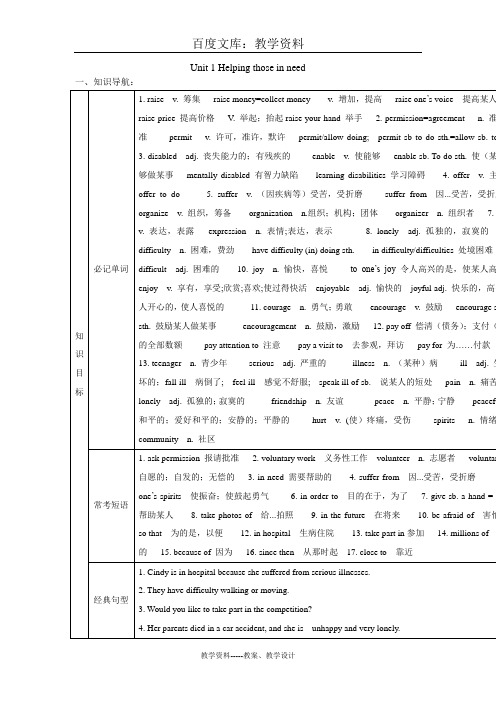
Unit 1 Helping those in need 一、知识导航:二、要点全解:1. raise (v) 筹募(钱);增加,提高;举起;提出;养育(raise = keep 有“饲养,抚养”的意思)第三人称单数:raises 过去式:raised 过去分词:raised 现在分词:raising1. We raised some money for the Project of Hope.2. If you answer the teacher’s questions, you must raise your hand.3. The book raises many important questions.4. The local government raised the price of house.5. They were both raised in a poor family.(1) 这两个词都有“提高,上升,增加”的意思,但其用法不同.raise是及物动词,其主语通常是人;而rise是不及物动词,其主语通常是物.例如:The sun rises and bathes the earth. 太阳升起,普照大地.(2) raise和rise用于同一事物时含义不同, raise是人为增加或提高,而rise是自然增加或提高.例如:The price of TV sets has been raised recently. 最近电视机提价了.(政府或厂家主动行动)The price of TV sets has risen recently. 最近电视机提价了.(市场调节)2. permission (n.) 允许= agreement 准许;批准例如:Without permission, you mustn’t enter the teachers’ office.同根词:permit v. 许可,准许;默许permit --- permitted ---- permittedpermit sb. to do sth. = allow sb. to do sth 允许某人做某事例如: The guards permitted me to bring my camera and tape recorder.辨析:permit, allow, let的区别:allow与permit在很多情况下意义是相同的,可换用.但allow侧重听任或默许,即不加阻止,语气较轻;permit通常指上级、规则或法令等表示的准许,指给予做某事的权利,如通过法令和正式条文“允许”做某事,语气较重;let指允许某人做某事,含有不加限制之意,多用于口语中,后面接不带to 的动词不定式作宾语补足语.3. I helped sick children. sick adj. 生病的 a sick man/the sick 病人【辨析】sick and ill:4. I taught disabled children to sing.disabled 英[dɪs'eɪbld] adj.残废的;有缺陷的用作形容词(adj.)同根词:disable v. = make (sb.) unable to do sth. 使无能力;使残废,使伤残enable v. = make (sb.) able to do sth. 使(某人)能够做某事teach sb. to do. sth. 教某人做某事5. Three teenagers offered to do some voluntary work during the school holidays.provide用于表示无主动慷慨之意地为人或物提供需要或有用的东西,仅仅是出于某种责任,强调提供必须用的东西,尤其是生活用品.常用于provide sb. with sth. 或provide sth. for sb. 的固定搭配中.offer表示主动提供服务、工作等.常用于offer sb. sth.或offer sth. to sb. 固定搭配中.例如:offer sb.主动提出帮助某人;offer sb. a good salary 给某人一个好工资.(2)辨析:during, in与for6. The children there all suffer from serious illnesses. suffer(名词)sufferingsuffer from sth. 因某事受苦、受折磨,其后常接表示疾病、痛苦、寒冷、饥饿悲伤等的词语Many teenagers are suffering from the computer games.suffer (vt.) 和suffer from 的区别:suffer 指一般的损害、痛苦等等,但suffer from 指长期的或习惯性的痛苦或困难.suffer :1. 感到疼痛、痛苦 He died very quickly, he didn't suffer much. 他死得很快,没有多少痛苦.2. 承受,遭受You must be prepared to suffer consequences. 你要准备承担后果.suffer from : 1. 患有(疾病等) She suffers from headache. 她患头痛病2. 为...所苦,因...而吃苦头 I'm suffering from a real lack of time this week. 我这周为时间不够用而苦.7. We taught them to tell stories. tell v. 讲述,告诉 tell stories 讲故事【辨析】tell, talk, speak, say :(3) He can speak Japanese and Chinese. (4) Can you say it in English? 8. help them express their feeling: 帮助他们表达感受Help sb do (to do) sth: 帮助某人做某事E.g.:I always help my mother clean the house on Sundays.express v. 表达;表露.同根词:expression n. 表现,表示,表达;表情E.g.:This helps them express their feelings. 这有助于他们表达他们的情感.She gave expression to her sadness. 她流露出了悲伤之情.9. We spend time with a girl called Vivien.spend v. 度过,消磨跟踪练习1. They spend too much time the report.A. writingB. to writeC. on writingD. write2. --Will you please for my dinner Peter? --Sure!A. spendB. payC. costD. take3. It will me too much time to read this book.A. takeB. costC. spendD. pay4. This science book ____ me a great amount of money.A. tookB. costC. usedD. spent5. --The T-shirt looks nice on you! How much does it ____?--I just _____ ten dollars for it.A. take; affordedB. cost; paidC. cost; spentD. costs; spend10. Her parents died in a car accident, and she is unhappy and very lonely.(1) die v. 死dying,现在分词dead adj. 死去的the dead 死人death n. 死亡(2) unhappy adj. 伤心的,不快乐的【拓展】构词法讲解:前缀【辨析】lonely,alone的用法区别:【一言辨异】I was travelling alone in the lonely mountain. I didn’t feel lonely though I was alone.跟踪练习:Though his grandparent lives____, he never feel _____.A. alone; aloneB. alone; lonelyC. lonely; lonelyD. lonely; alone11. She needs friendship.need: 此处为实义动词,意为“需要”.后面可接名词、代词或动词不定式.E.g.: They don’t need any help. / He needs to have a good rest.【注意】need后接动词-ing形式时表示被动意义. The flowers need watering. 【拓展】need 作情态动词时,没有人称和数的变化,后接动词原形,主要用于否定句和疑问句中.You needn’t become very nervous.-Must I bring my homework now? – No, you needn’t. You can bring it tomorrow.12. My mother and I will continue to visit Vivien.Continue vt. continue to do/continue doing 继续做某事They continued to read/reading the book.vi. 继续,连续,延伸The snow continued for two days.continue with sth. 使某事物继续存在或不断发生You can continue with your work.13. They have difficulty walking or moving.have difficulty (in) doing/have difficulty with sth.I have difficulty in (solving) the problem.I have great trouble in ____________(finish) the work by myself. Could you help me?14. I taught them to sing because music can bring them joy and peace.bring: 及物动词,意为“带来”.【辨析】bring, take, get, carryA. takeB. bringC. getD. carry15. We need to help children like Tim and raise their spirits.like 介词,像Teenagers want to be famous like Liu Xiang.look like 看起来像; sound like 听起来像; feel like doing想做某事动词,喜欢like doing/like to do16. I will continue to do voluntary work in the future.in the future在将来in future=from now on从今以后17. in good health 身体健康healthy adj.18. A person with courage is usually not afraid of something dangerous or difficult.(1)courage n. 勇气;勇敢He showed great courage and determination. 他表现得十分勇敢和果断.同根词:encourage v. 鼓励,鼓舞;支持;促进;鼓动My English teacher often encourages us to read English aloud. 我的英语老师常常鼓励我们大声读英语.(2)be afraid of: 害怕...19. make friends with sb. 和...交朋友;exchange seats 交换座位; shake hands with... 与...握手; take turns to do轮流做某事20. He used to love sports until he hurt his legs in an a accident.(1) Until 直到...的时候,直到...为止,一般可与“till”替换(not…until:直到...才)We walked until it got dark. The supermarket is open until at 9 .The little girl didn’t stop crying unti l she saw her mother.(2) hurt v. = injure 使疼痛;受伤Tim hurt his legs in an accident, but he has lots of courage. 提姆在一次事故中伤了腿,但他很勇敢.同根词:hurt adj. 受伤的;痛苦的;(受)损坏的They did not seem to be badly hurt. 他们看起来没有受重伤.搭配:hurt oneself 受伤Have you hurt yourself? 你伤着自己了吗?跟踪练习Tigers wait _____ it is dark, and then go out to find their food.A. sinceB. untilC. asD. because21. Thanks for your help. Thanks / Thank you for doing/sth.22. I am thinking about playing tennis.think about 考虑,想; think of 想,想起,认为; think over 认真考虑,仔细考虑E.g.: He is thinking about a problem.The old picture made me think of my childhood./What do you think of the book?Think over the question before you answer it./ Let me think it over.23. be able to do 不能做某事/ be unable to do能够做某事24. Eight-three per cent/percent of them were girls.E.g.: Thirty per cent of students in our class take buses to school.In China, seventy percent of drinking water is from groundwater.25.Because of this, the CCTF launched the Spring Bud Projects to help them.Because of由于,因为【辨析】because of,because26. Since then, the project has helped millions of girls return to school. Return,回来;返回(1)since then, 从那时起,常用于现在完成时(2)return to回到...; return from.从...回来;(3)return=giveback I borrowed a book from the school librar y, I haven’t returned it yet.27. Now I work as a teacher at a Spring Bud school here in Guangxi. as 介词,作为as 介词,作为,He came to China as a tourist five years ago.副词,同样地,通常用于as...as句型中,He is as old as me.连词,像...一样,按照,如同;当时Do as I do. I saw him as he was getting off the bus.28. interview sb. 采访某人;have an interview with sb. 采访某人,和某人交谈三、语法专项:动词不定式的用法.1. 基本结构:to + 动词原形(有时可省略to)not to + 动词原形(否定形式)2. 可在句子中充当成分:主语、表语、宾语、宾语补足语、定语和状语等.3. 主要用法归纳:(1)作宾语:常作及物动词的宾语.常跟动词不定式作宾语的动词有:want, wish, hope, manage, pretend, decide, learn, agree, expect, demand, long, ask, care, choose,dare, fail, offer, plan, prepare, promise, refuse, desire, happen, appear, intend, like等.当动词不定式作宾语时,如果后接宾语补足语,常用it作形式宾语,而把真正的宾语放在宾语补足语后. I find it difficult to learnJapanese well.B. 当两个或两个以上的不定式连用时,后面的不定式往往省略to.He began to read and write after dinner.(2)作宾语补足语:动词不定式做作宾语补足语,放在宾语后面,表示宾语时什么或怎么样.常跟动词不定式作宾语补足语的动词有:ask, tell, like, love, hate,would like, order, teach, want, wish, advise等.应加上to.I saw Li Lei fall down from his bike. / The boss made the workers work over ten hours a day in the past.这些动词可归纳为:“一感(feel),二听(listen to, hear),三让(let, make, have,,四看(look at, see, watch, notice),半帮助(help)(即在动词help后面作宾语补足语时,to可有可无)”.(3)作目的状语:动词不定式表目的时,可放在句子的前面,也可放在句子的末尾.但在句子前面时,动词不定式常用逗号与句子隔开,而在句子末尾时一般不用逗号隔开.To get there on time, we set out at five in the morning.He goes there to enjoy the fresh air.【拓展】为了强调目的,有时可以在不定式前加in order或so as.In order to get there on time, we set out at five in the morning.常用结构:too + adj./adv. + to do sth.:太...而不能.The child is too young to go to school.(4)疑问词+动词不定式:疑问代词who, what, which等和疑问副词when, where, how等后面跟不定式,构成不定式短语.这种结构在句中可作主语、宾语、表语、宾语补足语等句子成分.1. Where to go is still a question. 到哪里去还是个问题.(作主语)2. I know where to find the boy. 我知道到哪里能找到这个男孩.(作动词know的宾语)3. The question is how to learn English well. 问题是怎样学好英语.(作表语)【拓展】“疑问词+动词不定式(短语)”作宾语时,相当于一个宾语从句.I don’t know what to do next time. = I don’t know what I should do next time.Li Ping does n’t know why to learn En glish. = Li Ping doesn’t know why he should learn English.Which to choose is important. = Which we should choose is important.The question is where to go. = The question is where we should go.(5)固定句式中动词不定式的用法:常见固定句式中的动词不定式考点:had better (not) do sth./Would you like to do sth.?/Why not do sth.?/Would you please (not) do sth.?等.(6)动词不定式专项训练题:一、单项选择.1. Tom find _______ difficult to work out the Maths problem.A. ThisB. ThatC. ItD. Its2. We decided _______ at the end of this month.A. travelB. not start outC. to leaveD. going3. They have no paper_______.A. to writeB. to write withC. write on D .to write on4. Let him _______ a rest. I think he must be tired after the long walk.A. hasB. haveC. to haveD. having5. _______the computer is a problem.A. How to useB. What to useC. Where to useD. Which to use6. The teacher told us _______in bed.A. don’t readB. read notC. to not readD. not to read7. The old man was _______angry _______ say a word.A. so, thatB. as, asC. too, toD. very, to8. Why _______home tomorrow?A. not goB. not goingC. not to goD. didn’t go二、用所给动词的正确形式填空.1. They want _______(save) time by using shorter words and phrases.2. Kitty’s classmate Daniel taught himself how _______(make) a home page.3. He put his photos on it for everyone _______(look) at.4. Help him _______(put) the photos in the correct order.5. He made the girl _______(cry) yesterday.6. I’d like _______(go) to the Temple of Heaven.Homework一、背诵课后单词.二、熟读课文.三、练习:1. 按照要求写单词.raise (v.) ---- (过去式)----- (过去分词)hurt (v.) ---- (过去式)---- (过去分词)meet (v. ) ---- (过去式)---- (过去分词)teach (v.) ---- (过去式)---- (过去分词)permit (v.) --- (过去式)--- (过去分词)permit (v.) ---- (n. 准许,许可)organize (v.) ---- (n.组织) express (v.) --- (n.表达)pain (n.) ---- (adj.疼痛的) joy (n.) ---- (adj.欢乐的)peace (n.) --- (adj.和平的) voluntary (adj.) ---- (n.志愿者)ill (adj.) ---- (n.疾病) difficult (adj.)---- (n.困难)friend (n.) 朋友---- (n友谊) courage (n.) ---- (v鼓励)2. 根据句意及首字母提示完成单词.1. The old man fell off his bike and ____________ his knee(膝盖).2. Let’s do something for the old people in the __________(社区).3. I p_______ thirty yuan for the book last week.4. We saw a ___________(严重的)accident yesterday.5. _____________(友谊)is important in our life.6. Tell him to ask my p____________ before he borrows something.7. They are ___________(筹集)money for the people who lost homes in the earthquake.8. He is __________ from a bad cold.9. Bill is not afraid to _____________(表达)his opinions.10. I have ____________ in solving the problem.11. We should ____________(鼓励)the d____________ to raise their ___________.12. Tom is in hospital because of a serious ___________(疾病).13. They had to stay at home b__________ of a heavy snow.3. 用所给词的适当形式填空.1. ___________ (help) others make me happy.2. Daming has great difficulty ___________(speak) English.3. In order _____________ (learn) Japanese, he went to Japan.4. Do you know the girl ___________(call) Lily?5. Shenzhen has a population of over ten ____________(million).6. The teacher is _____________(friendship) to us.7. Our teacher encourage us _________________ (not give) up when we meet difficulties.8. He is __________(able) from voting.9. The children there all suffer from serious ___________(ill).10. She gave ____________(express) to her sadness.11. It felt like the ___________(alone) place in the world.12. I had no _________ (difficult) making myself understood.13. Evening in the country is a very__________(peace) time.14. I taught them to sing because music can bring them _________(enjoy) and peace.15. What do you know about our __________(organize) ?4. 单项选择.( )1. Peter offered to teach them water-skiing.A. is willingB. is not willing toC. is readyD. is not ready( )2. Is there _________ in today’s newspaper?A. special somethingB. something specialC. special anythingD. anything special( )3. The teacher speaks very loudly ______ all the students can hear her.A. so thatB. becauseC. sinceD. When( )4. --How much did you _____ for the computer? --4,000 yuan.A. SpendB. CostC. payD. take( )5. Sam’s parents died in an accident. He feels very_________.A. tiredB. busyC. shyD. lonely( )6. “What are you going to do this weekend?” “I’d like my parents.”A. to visitB. visitC. visitingD. visits( )7. —What’s your plan for the summer holidays?—I’ve no idea, but I’ve decided at home.A. stayB. to stayC. stayedD. staying( )8. Last week our geography teacher told us more information about how to protect the environment.A. getB. gotC. to getD. getting( )9. Our headmaster asked us a report on how to protect wild animals.A. writeB. writingC. to writeD. wrote( )10. — How do you feel when you watch the national flag go up?—It makes me very proud.A. feltB. to feelC. feelingD. feel( )11. It took her half an hour the Water Park by bus last Sunday.A. gets toB. get toC. to get toD. getting to( )12. It’s dangerous for you that tall tree.A. climbB. to climbC. climbingD. climbed( )13. —My brother is ill in hospital.—I’m sorry that.A. hearB. hearingC. heardD. to hear( )14. The TV set is too loud. Will you please _______?A. turn down itB. turn it downC. to turn it downD. to turn down it ( )15. It’s cold outside. You had better _______ your coat.A. to put onB. putting onC. puts onD. put on5. 阅读理解.It was a very hot day. Two farmers, Jack and Jim, sat in the shade of a large neem tree. Both of them were eating chapattis (印度薄饼) for lunch. Jack had three pieces of the flat, round Indian bread while Jim had five. As they were about to begin their meal, a young nobleman (贵族) went by."Good day! Good sirs!" said the nobleman. The nobleman looked very hungry and tired, so Jack and Jim invited the man to eat with them."How can we divide these eight chapattis into three equal parts among the three of us?" asked Jack."Let us stack (叠起来) them up and cut the chapattis into three equal parts," suggested Jack.After cutting the chapattis, they shared the parts equally, and no one ate more or less than anyone else.After they finished the meal, the nobleman insisted on (坚持) paying for his meal. He put six coins in Jack's hand and ten coins into Jim's hand. And the two men were both very glad!( ) 1. How many people are there in this story?A. Two.B. Four.C. Five.D. Three.( ) 2. What does the underlined word "divide" mean in Chinese?A.把……切割B.把……丢弃C.把……留给D.把……分成( ) 3. How did they divide the eight chapattis into three equal parts?A. They stacked them up and cut them into three equal parts.B. They weighed them and cut them into three equal parts.C. They numbered them and divided them into three equally.D. All three people ate two chapattis and left the rest.( ) 4. The nobleman paid _________ for his meal in all.A. six coinsB. ten coinsC. sixteen coinsD. four coins( ) 5. Which is TRUE according to the passage?A. There are nine pieces of the flat, round Indian bread in all.B. The nobleman didn't look hungry and tired at all.C. Jim thought of a good idea to cut the chapattis equally.D. All the three peopleshared the parts equally at last.6. 完型填空.Are you ready for the adventure of your lifetime? Do you love to travel and ___1___ new people?If your answer ___2____ these questions is "Yes", then read on.Have you ever lived and studied in ___3____ country? No? Well, now it is your chance!Student exchange (交换) is fun, exciting and will teach ___4___ new things. It gives you the chance to experience a ___5___ culture and learn a new language. You will never have another experience like this!There are two stages (阶段) in every student exchange, a hosting stage and a visiting sage. For hosting stage, an exchange student will travel to your hometown and ___6___ with your family for three months. Then, you will travel to the hometown of your exchange partner and live with his or her family for three months ___7___ the visiting stage. You will go to school there and live just like a member of the host family.____8___ can go on a student exchange? All secondary school students can go on an exchange if you have done ___9___ in your class this year. You should be 14-17, and you would like to learn the language, culture, history, geography and the way of life in another country. And you should have your application (申请) approved (批准) by the head teacher.So, what are you ___10___ for? Apply today!( ) 1. A. watch B. talk C. meet D. look( ) 2. A. to B. of C. with D. for( ) 3. A. others B. the other C. other D. another( ) 4. A. your B. you C. his D. our( ) 5. A. different B. same C. strange D. usual( ) 6. A. study B. learn C. help D. live( ) 7. A. after B. before C. during D. between( ) 8. A. Who B. What C. Which D. When( ) 9. A. good B. nice C. well D. hard( ) 10. A. waiting B. living C. playing D. inviting。
上海牛津全国版初二下册unit 1helping those in need
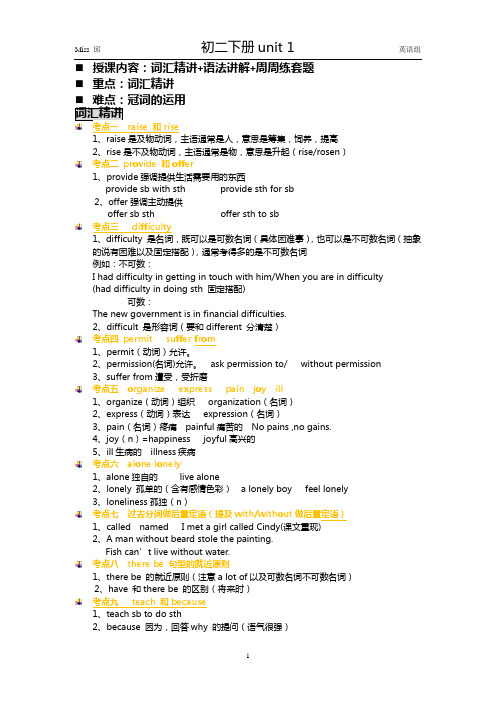
⏹授课内容:词汇精讲+语法讲解+周周练套题⏹重点:词汇精讲⏹难点:冠词的运用词汇精讲考点一raise 和rise1、raise是及物动词,主语通常是人,意思是筹集,饲养,提高2、rise是不及物动词,主语通常是物,意思是升起(rise/rosen)考点二provide 和offer1、provide强调提供生活需要用的东西provide sb with sth provide sth for sb2、offer强调主动提供offer sb sth offer sth to sb考点三difficulty1、difficulty 是名词,既可以是可数名词(具体困难事),也可以是不可数名词(抽象的说有困难以及固定搭配),通常考得多的是不可数名词例如:不可数:I had difficulty in getting in touch with him/When you are in difficulty(had difficulty in doing sth 固定搭配)可数:The new government is in financial difficulties.2、difficult 是形容词(要和different 分清楚)考点四permit suffer from1、permit(动词)允许。
2、permission(名词)允许。
ask permission to/ without permission3、suffer from遭受,受折磨考点五organize express pain joy ill1、organize(动词)组织organization(名词)2、express(动词)表达expression(名词)3、pain(名词)疼痛painful痛苦的No pains ,no gains.4、joy(n)=happiness joyful高兴的5、ill生病的illness疾病考点六alone lonely1、alone独自的live alone2、lonely 孤单的(含有感情色彩) a lonely boy feel lonely3、loneliness孤独(n)考点七过去分词做后置定语(提及with/without做后置定语)1、called named I met a girl called Cindy(课文重现)2、A man without beard stole the painting.Fish can’t live without water.考点八there be 句型的就近原则1、there be 的就近原则(注意a lot of以及可数名词不可数名词)2、have 和there be 的区别(将来时)考点九teach 和because1、teach sb to do sth2、because 因为,回答why 的提问(语气很强)例如:want ask tell order wish invite encourage beg decide manage would like be able afford agree determine offeradvise be ready prepare warn●这些词后面通常都省略to,会直接使用do sthlet make help1、It’s +形容词+for sb to do sthIt’s +形容词+of sb to do sthit +形容词+for sb to do sthin the world.A. producingB. to produceC. having producedD. produced2. The purpose of new technology is to make life easier, ____it more difficult.A .not making B. not make C .not to make D. nor to make3. Helen had to shout ______above the sound of the music .A .making herself hear B. to make herself hearC. making herself heard D .to make herself heard4. I don’t know whether you happen_______ ,but I am going to study in the U.S.at his September. A .to be heard. B. to be bearing C .to hear D .to have heard5. The news reporters hurried to the airport, only ______the film stars had left.A .to tellB .to be toldC .tellingD .told6. You were silly not _______your car.A. to lockB. to have lockedC. lockingD. having locked7. The teacher asked us ______so much noise.A .don’t make B. not make C. not making D .not to make8. An army spokesman stressed that all the soldiers had been ordered _____clear warnings before firing any shots.A .to issue B. being issued C. to have issued D. to be issued9. I’d rather have a room of my own, however small it is, than_______ a room with someone else. A. to share B. to have shared C. share D. sharing 10. The bank is reported in the local newspaper_______ in broad daylight yesterday.A. robbedB. to have been robbedC. being robbedD. having been robbed11. A number of paintings in the castle are believed ________in a fire.A. being destroyedB. having been destroyedC. to be destroyedD. to have been destroyed12. The meeting _______ next week is sure to be a great success.A. to take placeB. to be taken placeC. to have taken placeD. being taken place13. As a result of my laziness, I failed ________ my work in time.A. and finishedB. to finishC. and finishingD. to finished14. I am sorry ______ written you a letter at the time.A. to have notB. to not haveC. not to haveD. not having15. Will you lend him a magazine _________?A. to be readB. for readingC. to readD. he read16. He could do nothing but _______for the bus _________.A. wait, to comeB. wait; comeC. waiting; comingD. waited; came17 .It is a problem that doesn't need ________ right now.A. to solveB. solvingC. being solvedD. to be solving18. There’s a man at the reception desk who seems very angry and I think he me ans _______ trouble.( )3. The birds flew to the windows because ________.A. they found the windows cleanB. they fought for more foodC. all they saw was the reflection of the garden.( ) 4. The underlined word “hawk” means in Chinese.countries, have found that a large number of women wished they had born men. The number is said to be as high as 60% in Germany.“Women often wish they had the same chances _____1_______men have, and think it is still men’s world,”said Dr. James Helen, one of the sociologists _______2______ did the study. Many men say that they have more duties than women. A man has to make money to support his family and to make the important decision, so it is right _____3_______ men to be paid more. Some are even against their wives working at all. When wives go out to work, they say, the home and children can not _______4______(take) good care of. If women take full-time jobs, they won’t be able to do _____5______they are best at doing: making a nice home and bringing up the children.Some women ______6_______(agree). They say they want to get out of their homes and to have freedom to choose ______7_______ work and home life. Women have the right of equal pay and equal chances.Anne Harper has a very good job. She also believes in ---“Women’s Liberation(解放)”. “I don’t wish I were a man,”she says, “and I don’t think many women do. But I do wish people would stop _____8______(treat) us like second-class people. At work, for example, we usually do the work that man do but get paid ______9______(little). There are still a lot of jobs only to men---usually they are the best ones. If you are a man, you have a much better chance of living a _____10________(wonder) life. How many women scientists are there…or engineers ?”括小组自由活动。
新沪教牛津版英语八下Unit1Help those in need.Listening and speaking

Listen to the radio programme about different types of money-raising activities. Then complete the table on Page 6.
1
Talking about plans
A: What are you going to do this afternoon? B: I’m thinking about going to the library. I’m planning to go to the library (不确定要去做) A: What are you going to do this weekend? B: I’m going to buy a book. (确定要去做)
Keys; C D B G E
1
补全对话 A: What are you going to do after leaving school? B: I'm thinking about becoming a pilot. That way I would be able to travel. A: 1 B: Of course I do. I like to visit different places, make different friends and learn different things. A: That sounds good. You seem to be very healthy. 2 B: It's just so so. I find it difficult to learn it well. A: What can you do if you are not good at English? B: 3 I'll try to learn it better. 4 A: Maybe I'll try to be a businessman. I'd like to go into business and make some money. B: 5 . A: But I think being busy is better than doing nothing. B: Yes. I agree with you.
Unit 1 Help those in need课文讲解及语法填空题(含答案)
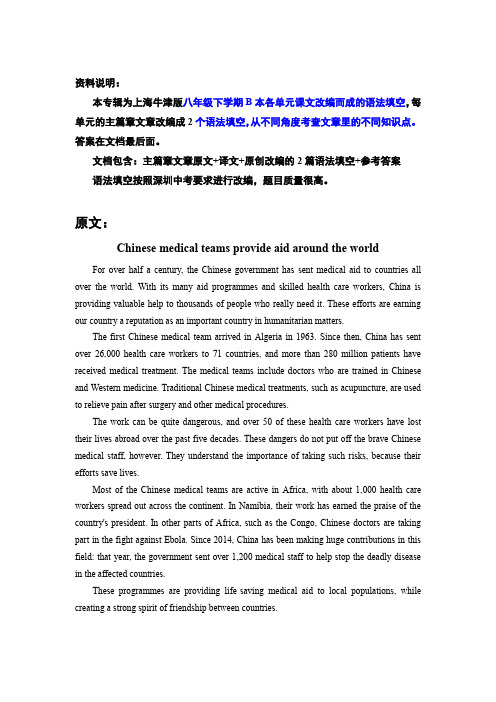
资料说明:本专辑为上海牛津版八年级下学期B本各单元课文改编而成的语法填空,每单元的主篇章文章改编成2个语法填空,从不同角度考查文章里的不同知识点。
答案在文档最后面。
文档包含:主篇章文章原文+译文+原创改编的2篇语法填空+参考答案语法填空按照深圳中考要求进行改编,题目质量很高。
原文:Chinese medical teams provide aid around the world For over half a century, the Chinese government has sent medical aid to countries all over the world. With its many aid programmes and skilled health care workers, China is providing valuable help to thousands of people who really need it. These efforts are earning our country a reputation as an important country in humanitarian matters.The first Chinese medical team arrived in Algeria in 1963. Since then, China has sent over 26,000 health care workers to 71 countries, and more than 280 million patients have received medical treatment. The medical teams include doctors who are trained in Chinese and Western medicine. Traditional Chinese medical treatments, such as acupuncture, are used to relieve pain after surgery and other medical procedures.The work can be quite dangerous, and over 50 of these health care workers have lost their lives abroad over the past five decades. These dangers do not put off the brave Chinese medical staff, however. They understand the importance of taking such risks, because their efforts save lives.Most of the Chinese medical teams are active in Africa, with about 1,000 health care workers spread out across the continent. In Namibia, their work has earned the praise of the country's president. In other parts of Africa, such as the Congo, Chinese doctors are taking part in the fight against Ebola. Since 2014, China has been making huge contributions in this field: that year, the government sent over 1,200 medical staff to help stop the deadly disease in the affected countries.These programmes are providing life-saving medical aid to local populations, while creating a strong spirit of friendship between countries.译文:半个多世纪以来,中国政府一直向世界各国提供医疗援助。
【牛津版】英语八年级下册Unit 1《Helping those in need》基础教案

Unit 1 Helping those in need1.raise v.筹募raise money意为“募集钱款”.The students are raising money for the people who lost homes in the earthquake.v.增加;提高How can we raise English levels in a short time? 提高英语水平【提示】raise是一个及物动词,后可直接跟宾语.其常见的释义和用法还有:(1)使上升;使升起:We can see soldiers raise the national flag on Tian'anmen Square every morning.(2)提及;提起:The book raises many questions for readers to think about.(3)抚养;养育;培养:Father raised the family.(4)饲养;喂养:I want to raise a dog as my pet.【辨析】raise与riseraise,及物动词,“使上升;使升起”.一般指日常生活中的事物上升.如:举起了杯子、提高了租金.rise,不及物动词,(rise-rose-risen).说明一些自然现象的升起.如:日、月、云、雾、烟、蒸汽、河水、温度、物价以及人的职位等.【小试】I. 用上述动词的正确形式完成下列句子.(1).He _________ his head to look at me.(2).The people’s living standard has greatly been ______.(3).Her temperature is still ______.II. 从A、B、C、D四个选项中,选出可以填入空白处的最佳选项.(1).The prices are ______ fast these days. Nobody can get the prices do wn.A. going downB. risingC. raisingD. brought down.(2).They’ve ______ up to 20,000yuan for the Hope Project.A. roseB. raiseC. raisedD. risen2.permission n.准许;批准不可数名词Jim took the laptop without permission.ask permission意为“报请批准”.如:How many times have I reminded you that you need to ask permission first?我们可以用ask permission to do sth表示“征得同意做某事’.如:She asked permission to leave work early because her daughter was ill.give sb. permission to do sth意为“允许某人做某事”,与allow sb. to dosomething意思相近.Give yourself permission to take a break, even a little one.【链接】permit v.允许;准许;使有可能We hope to visit the school if time permits.如果时间允许3.Helping those in need帮助那些有困难的人in need意为“有困难的”,常位于名词后作后置定语.如:We are collecting money for families in need.A friend in need is a friend indeed.(谚语)患难中的朋友才是真正的朋友.我们用in need of表示“需要……”.如:The building is in need of repair.4.Read three students' reports on their voluntary work.voluntary work意为“义务性工作”.如:In her spare time she does voluntary work.她在业余时间做义工.voluntary为形容词,意为“志愿的;无偿的”.名词形式为volunteer,意为“志愿者”.5.serious adj.严重的He has a serious illness. There is nothing serious.Everyone knows how serious the danger is.大家都明白情况有多危险.【提示】serious还有如下的常见含义及用法:(1)认真的:He is a serious student and works very hard. 认真(2)严肃的:Be serious, John! Don't make fun of me. 严肃点,约翰!别拿我开玩笑.【链接】seriously adv.严重地He is seriously ill.他病得很重.6.illness n.(某种)病, 是可数名词,复数形式为illnesses.He died of a serious illness.他死于重病.【辨析】sick与illanize v.组织;筹备In the end, we all decided to organize a concert for Easter.复活节【链接】organization n.组织organizer n.组织者8.pain n.痛苦;苦恼The death of his father gave him great pain.父亲的死使他很痛苦.His unkind words caused her much pain.他说话很刻薄,弄得她很难受.(谚语)No pains, no gains. 没有付出,就没有收获.【链接】pain n.(身体上的)疼痛painful adj.痛苦的;苦恼的9.lonely adj.孤独的;寂寞的The darkness makes me feel so lonely.夜色让我如此孤寂.【比较】lonely与alone(江苏无锡中考)Though his grandmother lives______, she never feels______.A. alone; aloneB. lonely; lonelyC. alone ; lonelyD.lonely; alone10.peace n.平静;宁静I hope to find a little peace of mind.我渴望找寻到一丝内心的平静.Everything was at peace here.在这里,一切都很平静.【链接】peaceful adj.平静的;和平的peacefully adv. 平静地;和平地11.hurt v. (hurt,hurt)(使)疼痛;受伤Jack hurt himself while he was trying to escape from the police.He hurt his back in an accident.【提示】动词hurt还有以下一些常见的释义和用法:(1)(身体某部位)感到疼痛:My eyes hurt.(2)伤害(感情);使伤心:He is afraid of hurting Betty's feelings.1. a child without parents意为“孤儿”,相当于orphan.它是一个介词短语作后置定语的结构,即without parents作定语修饰名词child.类似的结构还有: the dogs in danger有危险的狗families with only one child独生子女家庭2.Three teenagers offered to do some voluntary work during the school holidays.offer to do something意为“主动提出做某事”.如:Nick offered to help Jack with his Maths homework.offer的主要用法有:3.The children there all suffer from serious illnesses. 那里的孩子都遭受着重病的折磨.suffer v.(因疾病等)受苦;受折磨She suffered greatly as a child. 她童年深受苦难.suffer from意为“因……受苦;受折磨”.如:Many teenagers are suffering from the computer games.His child is suffering from a bad cold.This country often suffers from floods and drought.4.I met a girl called Cindy.句中called Cindy是过去分词短语作后置定语,修饰a girl,意为“名叫辛迪的”.called也可用named来代替.The Kings have a daughter called/named Jessica.(姓金一家)【拓展】①作定语是过去分词的用法之一,过去分词短语作定语要放在被修饰词的后面.I like the songs sung by Liu Huan.②过去分词(短语)作定语相当于一个定语从句.I like the books written by Lu Xun. = I like the books that were written by Lu Xun.(兰州中考)--What are on show in the museum?--Some photos ______by the children of Yushu, Qinghai.A. have been takenB. were takenC. are takenD. taken5.This helps them express their feelings.这有助于他们表达自己的情感.express v.表达;表露He expressed to us his ideas about the new teacher.他向我们表达了他对新老师的看法.【提示】当express表示“表达;表露”之意时,通常不接双宾语.如:他对她表示了他的谢意.(×) He expressed her his thanks. (√) He expressed his thanks to her.【链接】expression n.表达;表情express one's feelings意为“表达某人的情感;抒发某人的感情”.如:Mother's Day gives people a chance to express their feelings toward their mum.6.We spent time with a girl called Vivien.spend time with意为“与……共度;陪伴”.如:While in Hawaii,Mr. Hill spent time with his wife.I spent time with my son and talked to him a lot.【拓展】【拓展】①spend还可以表示“花费”.How much money如you spend each week? 你每星期花多少钱?②常见搭配:sb. +spend (s)+money/time+(in) doing sth 某人花费金钱/时间做某事sb.十spend (s)+money/time+ on sth某人在某事/某物上花费金钱/时间He doesn't spend much money on food.(2013.山东潍坊) --Do you often get online?--Yes. I_______ lots of time on it. It's a good way to kill time.A. costB. spendC. takeD. use7.She needs friendship.need此处用作实义动词,意为“需要”,可构成: need sth; need to do sth.They don't need any help. He needs to have a good rest.而need doing sth,表示被动意义. These flowers need watering.【拓展】need作情态动词时,无人称和数的变化,后接动词原形,主要用于否定句和疑问句中.You needn't become very nervous.--Must I bring my homework now? --No, you needn't. You can bring ittomorrow.(No, you needn’t. = No, you don’t have to. 不,不必.)8.My mother and I will continue to visit Vivien.continue to do sth意为“继续做某事”.如:After reading Lesson 9, he continued to read Lesson 10.Though Peter is very busy, he will continue to help children at the localhospital.9.They have difficulty walking or moving.difficulty n.困难;费劲have difficulty (in) doing something表示“做某事有困难”.如:The students have difficulty (in) understanding the sentence.若后接名词,则常用have difficulty with sth的结构.如:Some students in this class have difficulty with English pronunciation.【拓展】类似的结构还有:have trouble (in) doing sth做某事有麻烦have problems (in) doing sth做某事有问题have fun (in) doing sth做某事有乐趣(2013.山东聊城)-I have great_____ in finishing the work by myself. Could you help me?-No problem.A. funB. successC. adviceD. difficulty10.A person with courage is usually not afraid of something dangerous or difficult.be afraid of意为“害怕,不敢”后可接名词、代词或动名词.She is afraid of snakes. I was afraid of going through the woods【拓展】①be afraid还可按不定式结构,即be afraid to do sth.,意为“害怕做某事”.He is afraid to go out at night.②be afraid 还可以接that从句,表示“担心/害怕……”He was afraid that he would lose.③I’m afraid…可翻译成“恐怕……”,属于口语中的委婉用语,表示遗憾、惋惜、判断或表示因不愿做某事面显得语气缓和些,其否定形式为I’m afraid... not...I’m afraid that I can't help you.我恐怕不能帮助你.(1).大多数形容词前加un-happy—unhappy lucky—unlucky fortunate—unfortunate fair—unfairimportant—unimportant healthy—unhealthy prepared—unprepared(2).以c-, e-开头的形容词,多加in-:correct—incorrect expensive—inexpensivedefinite—indefinite(3).以p开头的形容词,多加im-:possible—impossible polite—impolite (4).以r-开头的形容词,多加ir-:regular—irregular(5).有些形容词加dis-:honest—dishonest【拓展】含有加前缀构成的反义形容词的句子不属于否定句.在改为反意疑问句时,附加问句部分仍用否定形式. He is unhappy today, isn’t he?课堂练习I.用新单词完成下面的句子.如有必要,须改变单词的形式.1.I hope that our school will _____________ more outings in the future.2.We have been friends for nearly ten years. I hope our _____________willlast forever.3.The doctor said to William's mother, "It isn't a_____________ illness. Givehim enough water to drink and soon he will feel better. "4.We mustn't laugh at the_____________ and we should try our best to helpthem.5.The manager said to all the staff members, "I will_________ all your salarybecause you all havedone a good job. "6.You have helped me with the project so much. I don't know how to______________ my thanks.7.I don't think I have any _________ in working out the problem. It’s so easy.8.You shouldn't touch the machines without my _____________.9.If you want to make a public speech, you need not only good English but also_____________. That is to say, you should be brave.10.It was raining hard when I left the office. Mr. Smith, my boss, _________mea ride in his car home.II.选择适当的词组完成下列句子.如有必要,须改变形式.每个词组仅使用一次.1.My grandfather has _______________a serious heart disease for a long time.2.My friend____________ drive me to the airport because it was raining hard and Icouldn't find a taxi.3.The students_____________ completing the project. So most of them asked theirparents for help.4.I think you need to____________ before you use Wendy's computer.5.We should use the money to help those people____________.6.I don't want to go to Paris for such a short holiday. I'd rather stay at homeand________ my kids.7.Cheer up, Simon! Drink a cup of coffee now and it may ____________.8.The students at Mayfield School will____________ for the children in Africanext week.9.Nowadays, more and more teenagers take part in __________ to help people theydon't know at all.10.After Judy completed her Maths homework, she ____________ do morePhysics exercises.III.R eading comprehension.表示.( ) 1. The TV' cameras made Ricky feel nervous.( ) 2. Ricky started working on the show three months ago.( ) 3. It was Ricky's job to talk to each star.( ) 4. Ricky had a lot of things to do.( ) 5. The doors closed twenty minutes before the show.( ) 6. Many people gave money to Project Green Hope.( ) 7. Ricky hopes there will be more charity shows.(2).根据短文内容,将左右两栏中的句子正确配对.( ) 1. Ricky helped with the charity show a. he wanted to help raise money for Projectbecause Green Hope.( ) 2. The organizers chose Ricky to be the b. they started working on it two months ago.host of the show and( ) 3. They needed to practise a lot before c. he could not sleep the night before thethe show so show.( ) 4. Ricky was worried and afraid d. because of the TV cameras.( ) 5. Ricky was so excited that e. the noise from the fans.( ) 6. Ricky had to speak loudly because of f. he felt very happy and nervous as well.IV.Translation.1.我们可以通过唱歌、朗读诗歌来表达我们的感情.(express one's feelings)__________________________________________________________2.萨姆举起手来,想征得允许离开教室.(ask permission to do something)__________________________________________________________3.温迪从自行车上摔了下来,伤到了自己.(hurt)__________________________________________________________4.西蒙的爷爷独自居住,但他从不觉得孤独.(alone, lonely)__________________________________________________________5.她主动提出要帮母亲拿盒子.(offer to do something)__________________________________________________________6.那些青少年正在操场上开心地打着篮球.( teenager)__________________________________________________________7.长期的疾病让他变得很瘦,我都认不出来了.(illness, so…that)__________________________________________________________8.年前她遭遇了车祸,从那以后她经常背疼.(suffer from, pain)__________________________________________________________1.我们可以用am/is/are going to表达确定的打算或意图.如:She's going to buy a new dress.Cindy's parents are going to fly home.2.我们也可以用am/ is/are planning to表示计划和打算.We are planning to have a picnic in the forest park this Saturday.I am planning to teach the children to sing.3.我们可以用think of/about表示不确定的意图,即表示有想法,但不一定能实现.I’m thinking of going to watch a film.We’re thinking about starting a Music Club.--What are you going to do on Saturday? --(tidy my room)definite:indefinite:--What are you going to do on Sunday? --(visit my grandmother)definite:indefinite:--What are you going to do next Saturday? –(help mum clean the room) definite:indefinite:。
沪教牛津版英语八下各单元短语及语法要点

出生时
look for
寻找
between. ..and.
在…和...之间
in memory of
为了纪念...
give birth to
生孩子;产仔
at work
在工作
close to
几乎;接近
a can of
一罐
listen to
听
at the moment
此刻;当时
throw…at...
a lot of
许多,大量
how long
多长(时间)
fall asleep
睡着
more than
多于;超出
right now
立刻,马上
as much as
多达
the way to...
去某地的路
on one’s own
独自
throw. into..
把…扔进
a lot
很,非常
write to
给...写信
因为
write a letter to sb.
给某人写信
since then
从那时起
ask permission
报请批准
pay for
支付
suffer from
因…受苦;受折磨
stay at home
待在家里
take photos of
给…拍照
inone’s free time
在某人的空闲时间
lots of/a lot of
想起;记得
be careful
小心
have a good idea
有个好主意
watch out
沪教牛津版初中英语八下教材短语句型知识点汇总

Unit 1 Helping those in need阅读:读三名学生关于他们的志愿服务工作(voluntary work义务性工作)的报告。
听力:听一个关于筹钱活动的广播节目。
语法:学习如何使用不定式。
口语:学习谈论计划。
谈论你想参加的志愿活动。
写作:给校长写一封信,报请批准筹钱。
A. 短语归纳1. in need 需要帮助的2. voluntary work 志愿服务工作3. talk about 谈论4. write a letter to sb. 给某人写信5. ask permission 报请批准6. give sb. a hand 帮助某人7. suffer from 因…受苦;受折磨8. take photos of: 给…拍照9. lots of/a lot of 许多,大量10. raise one' s spirts 使振奋;使鼓起勇气11. in the future 在将来12. in good health 身体健康13. in bad health 身体不好14. be afraid of 害怕15.so that 以便,为了16. in hospital 生病住院17. make friends with sb. 跟某人交朋友18. bring sth.to sb. 将某物带给某人19. play tennis 打网球20. on Saturday 在周六21. in order to 目的在于,为了22. because of 因为23. since then 从那时起24. pay for 支付25. stay at home 待在家里26. help sb. with sth. 在某方面帮助某人27. close to 靠近28. listen for 留心听29. talk to 和……交谈30. use...for. 把…用于……31. give sb. some advice 给某人一些建议32. take part in 参加33. millions ofa 数以百万计的B. 句型归纳1. would like to do sth. 想要做某事2. teach sb. to do sth. 教某人做某事3. offer to do sth. 主动提出做某事4. want to do sth. 想做某事5. help sb.(to) do sth. 帮助某人做某事6. continue to do sth. 继续做某事7. have difficulty(in) doing sth. 做某事有困难8. need to do sth. 需要做某事9. enjoy doing sth. 喜欢做某事10. used to do sth, 过去常常做某事11. how much+ 不可数名词多少12. decide to do sth. 决定做某事13. begin to do sth. 开始做某事14. like to do sth. 喜欢做某事15. forget to do sth. 忘记要做某事16. plan to do sth. 计划做某事17. think about doing sth. 考虑做某事18. one of+ 复数名词/代词……之ー19. be unable to do sth. 不能做某事20. learn to do sth. 学习做某事21. wish to do sth. 希望做某事22. hope to do sth. 希望做某事23. make+sb./sth.+ 形容词使某人/某物…24. Thanks for( doing)sh. 因(做)某事而感谢。
八年级下册:Unit1-Helping-those-in-need第3课时语法讲解-牛津深圳版

food because it’s bad for my health.
A. not eating
B. not to eat
C. eating
D. to eat
5. --What did your teacher say this morning?
--She told us _____ make faces in class.
2.He hopes that he can visit the Great Wall.
He hopes _t_o___ ___v_i_s_it_ the Great Wall.
3.We don’t know what we shall do next.
We don’t kno用法4
感官动词、使役动词后接不带to的不定式
五看
watch see look at observe
notice
let
三 make 使 have
二听 listen to
hear
+sb. do sth. (不带to)
一感觉: feel
1. The teacher lets him _r_e_a_d(read)loudly. 2. The joke makes me__l_a_u_g_h_ (laugh). 3. I often see him _c_a_rr_y_( carry )water. 4. Do you hear birds _s_in_g__( sing) every morning?
reading the book.
A. to bring B. bringing C. bring
3. We are too tired. Let’s stop _____ a rest. A. to have B.have C.having
- 1、下载文档前请自行甄别文档内容的完整性,平台不提供额外的编辑、内容补充、找答案等附加服务。
- 2、"仅部分预览"的文档,不可在线预览部分如存在完整性等问题,可反馈申请退款(可完整预览的文档不适用该条件!)。
- 3、如文档侵犯您的权益,请联系客服反馈,我们会尽快为您处理(人工客服工作时间:9:00-18:30)。
Unit1 Helping those in need语法总结
一.基本形式:
to+动词原形(在某些情况下可以不带 to)
二.用法:
A.动词不定式作宾语:
1)V+to do:动词不定式位于一些动词后面,作这些动词的宾语。
这些动词包括agree, choose, decide, forget, fail, go on, learn, hope, mean (意味;想要),need, offer, plan, regret, require, remember, seem, stop, try, wish, want···
[注意]:部分动词后接不定式与接动名词的含义不同。
如stop, forget, remember
填空:
1. He decided to buy (buy) the camera.
2. I want to listen to (listen to) some music after class.
3. I hope to travel (travel) all over the world one day.
2)疑问词+to do:动词不定式位于疑问词之后。
这些疑问词包括who,what,where,how···
I don’t know what to do. (做什么)
how to do it / that. (怎么做)
where to go (去哪里)
when to leave (什么时候出发)
Which one to choose (选择哪个)
选择:I haven’t decided when to take a holiday yet.
A.took
B. taking
C. to take
D.take
B.做宾补----动词 + 宾语 +(to) do:动词不定式位于宾语之后做宾补。
1) 动词 + 宾语 +to do:这些动词包括tell. wish, ask, want,like, beg(请求), invite(邀请), warn(警告,提醒), allow, encourage, advise等。
例句:Li Mei asked me to show her the new dictionary.
2) 动词 + 宾语 + do (不带 to 的不定式):这些动词包括感官动词see, hear, feel, watch, notice;使役动词have ,make, let.(如果将其改成被动语态,
必须将不定式符号to还原。
)
例:Colors can change our moods(情绪) and make us feel happy or sad.
A.Feel
B. to feel
C. felt
D. feeling
固定搭配:make sb. do sth.
3)help +宾语+(to) do:在动词help之后做宾语或宾语补足语的不定式,to 可省略也可保留。
翻译:could you help me (to)carry the box?你能帮助我搬箱子么?
Will you help me (to) move the table? 请帮我搬一下桌子好吗?
C.作状语(可以表目的、表结果、表原因)。
例句:1. She stydied hard to pass the exam.她刻苦学习,以便通过考试。
2. Cindy used a brush to paint a picture of a park。
Cindy用一支
笔画一副公园的画。
注意:为了强调目的,有时可以把不定式放在句首,或在不定式前面加in order
to…或so as not to…
转换句子:
1.She studied hard to pass the exam. = to pass the exam,she studied hard。
2.Cindy used a brush to paint a picture of a park。
= To paint a picture
of a park ,Cindy used a brush 。
翻译:She organized a magic show to raise money。
= To raise money, she
organized a magic show。
Quiz
1. The workers want us ______ together with them.
A. work
B. working
C. to work
D. worked
2. There isn’t any differ ence between the two.
I really don’t know _________.
A. where to choose
B. which to choose
C. to choose what
D. to choose which
3. The teacher told them ____make so much noise.
A. don’t
B. not
C. will not
D. not to
4.He gave us some advice on how____ English.
A. learning B . learned C. to learn D . learn
5.I’m thirsty. Would you please give me something
________.
A .drunk
B .to drink
C .to be drunk
D .for drinking
6.Tom is the first _____ to school.
A . get
B . to get C. getting D . Got
7. The boy wanted to ride his bicycle in the street,
but his mother told him ______.
A. not to
B. not to do
C. not do it
D. do not to
8. I saw him _______ out of the room.
A. go
B. had gone
C. has gone
D. goes
9.---_______ more about tomorrow’s weather, call 121.
---OK, I will. Thank you.
A. Know
B. Knowing
C. To know
D. Known
10.We must do everything we can ____ waste water from
running into rivers.
A. keep
B. kept
C. to keep
D. keeping
11.Let’s ____ play in the street. Father tells me __ do so.
A. not to;not to
B. not;not to
C. don’t;to not
D. not to;don’t
12.When I came into the room, he pretended ____ his homework. A. to do B. be doing C. doing D. to be doing CBDC BBAA CCBA。
